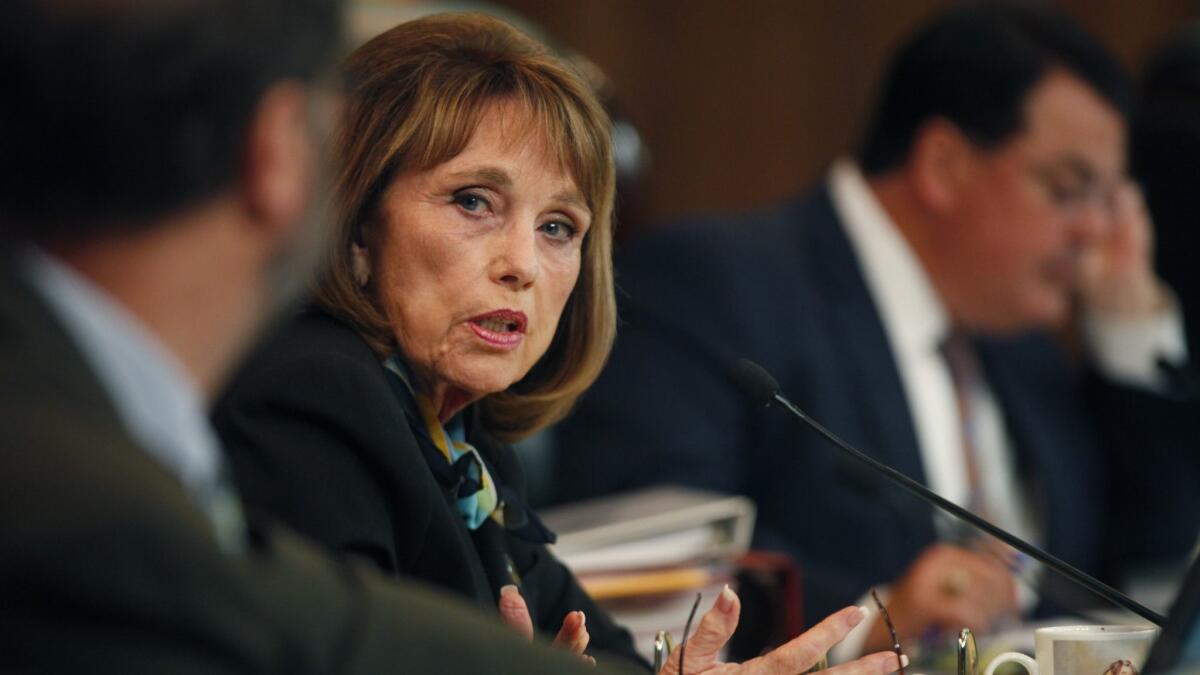Column: California’s closely watched races for Congress could have a domino effect on elections for the Legislature

- Share via
If November’s election finally shatters the maxim that “all politics is local,” it will be because even the elected positions thought to be in safe political harbors were swept into a historic partisan storm. And in California, the collateral damage could be in a handful of races for the Legislature.
The possibility of a legislative domino effect came to light last week when Democrats launched an unexpected effort to pump money and momentum into an effort to unseat state Senate Republican leader Patricia Bates of Laguna Niguel. Her Southern California district, stretching from Encinitas to Rancho Santa Margarita in Orange County, has never been considered a battleground. She won in 2014 by 31 percentage points, and Mitt Romney beat former President Obama there by more than 11 points in 2012.
But 2016 revealed GOP weakness in Bates’ 36th Senate District when Hillary Clinton beat Donald Trump there by almost 10,000 votes. And significant portions of her district cross over into three marquee congressional races: the reelection bids of GOP Reps. Mimi Walters of Laguna Beach and Dana Rohrabacher of Costa Mesa, and the seat left open by the retirement of Rep. Darrell Issa (R-Vista).
A poll conducted for The Times by UC Berkeley’s Institute of Governmental Studies shows Democrats are ahead in two of those races and tied in the third. Three Assembly districts, all represented by Orange County Republicans, also have constituents who will cast votes in those congressional races.
To the north, portions of an open state Senate district stretching from the Central Valley to the coast — represented by a centrist Republican for eight years but dominated by Democratic voters — overlap with the congressional districts of GOP Reps. Jeff Denham of Turlock and David Valadao of Hanford. Denham too trails in the Berkeley IGS Poll.
Once an electoral juggernaut, California’s prison-guard union steps back into the spotlight »
The pollsters found high motivation by Trump’s supporters in these districts. On issues, healthcare was cited as a top concern — which may explain why the Democratic effort to unseat Bates now features an ad calling her stance on that issue “heartless,” attacking her vote in the Legislature against the 2017 law that requires new transparency in prescription drug pricing.
It’s possible that Democrats are simply trying to force Republicans to spend money defending seats they otherwise could take for granted. But with GOP candidates being challenged in so many places comes the specter of dominoes falling in ways that would have profound effects for California Republicans.
The state Senate is of paramount concern for the GOP, as Democrats are only one seat shy of restoring their supermajority in the chamber — and with it, the power to craft tax increases and ballot measures on a party-line vote.
The great unknown is how the bitter politics of the moment in Washington will play when voters scan down the ballot. If there’s an effect in Sacramento, it certainly wouldn’t be without precedent. The 2012 election cycle hit Republican legislative races hard too, giving Democrats a supermajority in both legislative houses.
Most notable was the 1994 midterm election, the Republican wave that flipped control of Congress and knocked off three of the state’s incumbent House Democrats — lifting the GOP to victory in a majority of state Assembly races and later leading to the removal of Democrat Willie Brown as Assembly speaker.
The potential wave in 2018 could be even bigger. It’s hard to find any record of as many congressional races in California being this close at this point on the calendar. And voters casting ballots for or against one party might see no reason to differentiate between the party that will speak for them in Washington and the one that will do so in Sacramento.
Twitter: @johnmyers
More to Read
Get the L.A. Times Politics newsletter
Deeply reported insights into legislation, politics and policy from Sacramento, Washington and beyond. In your inbox three times per week.
You may occasionally receive promotional content from the Los Angeles Times.











